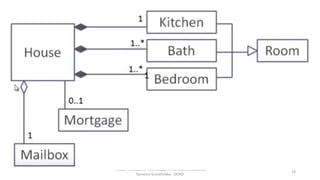IT1206- Object Oriented Analysis and Design- L10
- 1. Object Oriented Analysis and Design L10 IT1206 IT1206 - Institute of Technology, University of Moratuwa Sameera Gunathilaka - OOAD 1 Sameera Gunathilaka Lead Software Engineer ERP Technical Consultant
- 2. Types of UML Diagrams (Modelling Types) Structural UML diagrams Package diagram Object diagram Component diagram Composite structure diagram Deployment diagram Behavioural UML diagrams Activity diagram Sequence diagram Use case diagram State diagram Communication diagram Interaction overview diagram Timing diagram
- 3. Recap: What is a Class? ŌĆó A Class is a blueprint(template) for an object ŌĆó We use classes to create objects ŌĆó Classes describe the type of objects, while objects are usable instances of classes ŌĆó Objects have states and behaviours IT1206 - Institute of Technology, University of Moratuwa Sameera Gunathilaka - OOAD 3
- 4. Example A dog has - color, name, breed as well as behaviors - wagging, barking, eating. An object is an instance of a class. IT1206 - Institute of Technology, University of Moratuwa Sameera Gunathilaka - OOAD 4
- 5. UML Class Notation ŌĆó Class encapsulates: attributes (state) and operations (behaviour) ŌĆó attribute has a type ŌĆó operation has a signature IT1206 - Institute of Technology, University of Moratuwa Sameera Gunathilaka - OOAD 5
- 6. Example IT1206 - Institute of Technology, University of Moratuwa Sameera Gunathilaka - OOAD 6
- 7. Class Visibility ŌĆó + denotes public attributes or operations ŌĆó - denotes private attributes or operations ŌĆó # denotes protected attributes or operations IT1206 - Institute of Technology, University of Moratuwa Sameera Gunathilaka - OOAD 7
- 8. Parameter Directionality ŌĆó Direction: OUT or INOUT or IN ŌĆó It specifies its direction with respect to the caller IT1206 - Institute of Technology, University of Moratuwa Sameera Gunathilaka - OOAD 8
- 9. Perspectives of Class Diagram IT1206 - Institute of Technology, University of Moratuwa Sameera Gunathilaka - OOAD 9
- 10. Focus of this course: Conceptual
- 11. Relationships between classes IT1206 - Institute of Technology, University of Moratuwa Sameera Gunathilaka - OOAD 11
- 12. Strength of Relationships ŌĆó Most weakest relationship: Dependency ŌĆó Most Strongest relationship: Inheritance 12 IT1206 - Institute of Technology, University of Moratuwa Sameera Gunathilaka - OOAD
- 13. Dependency 13 ŌĆóA uses B ŌĆóChanging B will affect the A IT1206 - Institute of Technology, University of Moratuwa Sameera Gunathilaka - OOAD
- 14. Dependency example ŌĆó Cart class depend on the Product class ŌĆó Cart uses Products ŌĆó Changing the Product will affect the Cart ŌĆó Cart class depends on the Product class IT1206 - Institute of Technology, University of Moratuwa Sameera Gunathilaka - OOAD 14
- 15. Associations 15 ŌĆó Connects one instance of a class with an instance of another class ŌĆó Stronger relationship than Dependency ŌĆó An Employee works for a Company
- 16. Direction of Association Unary Association vs Binary Association IT1206 - Institute of Technology, University of Moratuwa Sameera Gunathilaka - OOAD 16
- 17. Unary Associations ŌĆó Class A knows Class B ŌĆó Class B knows nothing about Class A IT1206 - Institute of Technology, University of Moratuwa Sameera Gunathilaka - OOAD 17
- 18. Unary Association IT1206 - Institute of Technology, University of Moratuwa Sameera Gunathilaka - OOAD 18
- 19. IT1206 - Institute of Technology, University of Moratuwa Sameera Gunathilaka - OOAD 19
- 20. Binary Associations ŌĆó Class C knows about Class D ŌĆó Class D knows about Class C ŌĆó No arrow IT1206 - Institute of Technology, University of Moratuwa Sameera Gunathilaka - OOAD 20
- 21. IT1206 - Institute of Technology, University of Moratuwa Sameera Gunathilaka - OOAD 21
- 22. Multiplicity IT1206 - Institute of Technology, University of Moratuwa Sameera Gunathilaka - OOAD 22
- 23. IT1206 - Institute of Technology, University of Moratuwa Sameera Gunathilaka - OOAD 23
- 24. Reflective Association ŌĆó Objects in the same class can be associated IT1206 - Institute of Technology, University of Moratuwa Sameera Gunathilaka - OOAD 24
- 25. Association Class This places the responsibility for maintaining information pertaining to the association with the Ownership class. IT1206 - Institute of Technology, University of Moratuwa Sameera Gunathilaka - OOAD 25
- 26. Association Class -Example IT1206 - Institute of Technology, University of Moratuwa Sameera Gunathilaka - OOAD 26
- 27. Association Class -Example IT1206 - Institute of Technology, University of Moratuwa Sameera Gunathilaka - OOAD 27
- 28. Association Class -Activity ŌĆó Each Student can take multiple units ŌĆó A unit can be taken by many students ŌĆó Students who follow units can take exam multiple times if they fail We need to manage their marks for each attempt in the system IT1206 - Institute of Technology, University of Moratuwa Sameera Gunathilaka - OOAD 28
- 29. Association Class -Activity IT1206 - Institute of Technology, University of Moratuwa Sameera Gunathilaka - OOAD 29
- 30. Aggregation - Association ŌĆó Whole-part relationship( ŌĆ£Part ofŌĆØ Relationship) ŌĆó Removing Class B will not affect to the Class A IT1206 - Institute of Technology, University of Moratuwa Sameera Gunathilaka - OOAD 30
- 31. IT1206 - Institute of Technology, University of Moratuwa Sameera Gunathilaka - OOAD 31
- 32. IT1206 - Institute of Technology, University of Moratuwa Sameera Gunathilaka - OOAD 32
- 33. Composition - Association ŌĆó ŌĆśpartŌĆÖ depends on the ŌĆśwholeŌĆÖ ŌĆó Parts are destroyed when the whole is destroyed IT1206 - Institute of Technology, University of Moratuwa Sameera Gunathilaka - OOAD 33
- 34. IT1206 - Institute of Technology, University of Moratuwa Sameera Gunathilaka - OOAD 34
- 35. IT1206 - Institute of Technology, University of Moratuwa Sameera Gunathilaka - OOAD 35
- 36. Inheritance (or Generalization) ŌĆó Represents an "is-a" relationship. ŌĆó An abstract class name is shown in italics. ŌĆó SubClass1 and SubClass2 are specializations of SuperClass. IT1206 - Institute of Technology, University of Moratuwa Sameera Gunathilaka - OOAD 36
- 37. Realization ŌĆó Source class support all the operations of the target element ŌĆó Relationship between the interface and the implementing class ŌĆó Realization is a relationship between the blueprint class and the object containing its respective implementation level details. IT1206 - Institute of Technology, University of Moratuwa Sameera Gunathilaka - OOAD 37
- 38. IT1206 - Institute of Technology, University of Moratuwa Sameera Gunathilaka - OOAD 38
- 39. Thank you IT1206 - Institute of Technology, University of Moratuwa Sameera Gunathilaka - OOAD 39
Editor's Notes
- #3: We are learning mainly those highlighted diagrams
- #6: Visibility of Operations and attributes
- #10: Conceptual: represents the concepts in the domain Specification: focus is on the interfaces of Abstract Data Type (ADTs) in the software Implementation: describes how classes will implement their interfaces
- #15: Cart class depends on the Product class ŌĆō correct Product class has a dependency on Cart - wrong
- #17: One way or two way One directional vs Bi-directional
- #19: Person Has an Address
- #21: Customer can own accounts Account is belonged to a Customer
- #24: Hose has one Kitchen, one or many bathroom, one or many bedrooms Kitechn, Bath,Bed rooms are rooms House has a one mail box House can have a mortgage one time or not
- #25: Company has Employees A single manager responsible for up to 10 workers
- #31: Belt is a part of me now, but belt can exist without me Watch is a part of me, but it exists without me
- #32: Removing the ║▌║▌▀Ż will not affect to the Lake
- #33: Hose has one Kitchen, one or many bathroom, one or many bedrooms Kitechn, Bath,Bed rooms are rooms House has a one mail box House can have a mortgage one time or not
- #34: Class B live or die with Class B Hand is a part of me, but hand cannot exist without me. But I can exist without hand
- #35: Department is a part of Company. Department cannot exist without Company. But Company can exist without department.
- #36: Hose has one Kitchen, one or many bathroom, one or many bedrooms Kitechn, Bath,Bed rooms are rooms House has a one mail box House can have a mortgage one time or not
- #37: Most strongest relationship







































